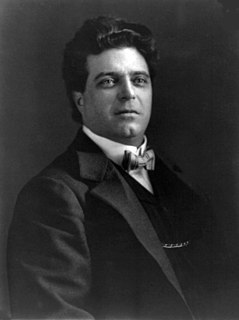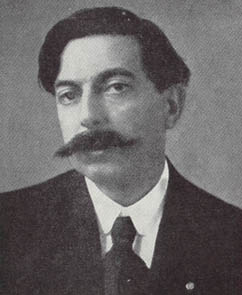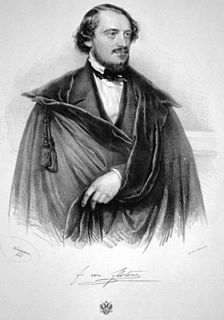Margherita is a 1848 opera by the then 23-year old Italian composer Jacopo Foroni.

Jacopo Foroni was an Italian opera composer and conductor who spent most of his working life in Sweden.
Margherita is a 1848 opera by the then 23-year old Italian composer Jacopo Foroni.

Jacopo Foroni was an Italian opera composer and conductor who spent most of his working life in Sweden.

County Wexford is an eastern county in Ireland, bordered by the Irish Sea. It is in the province of Leinster and is part of the South-East Region. It is named after the town of Wexford and was based on the historic Gaelic territory of Hy Kinsella, whose capital was Ferns. Wexford County Council is the local authority for the county. The population of the county was 149,722 at the 2016 census.

Wexford is the county town of County Wexford, Ireland. Wexford lies on the south side of Wexford Harbour, the estuary of the River Slaney near the southeastern corner of the island of Ireland. The town is linked to Dublin by the M11/N11 National Primary Route; and to Rosslare Europort, Cork and Waterford by the N25. The national rail network connects it to Dublin and Rosslare Europort. It had a population of 20,188 according to the 2016 census.

The Wexford Festival Opera is an opera festival that takes place in the town of Wexford in south-eastern Ireland during the months of October and November.
The Festival della Valle d’Itria is a summer opera festival held in the south eastern Italian town of Martina Franca in the Apulia region. The Festival was founded in 1975 and performances are given in July and August each summer on a specially constructed stage in the outdoor courtyard of the Palazzo Ducale.

The Theatre Royal, was an opera house and performance venue in Wexford Ireland which opened in 1832 and closed in 2005. It was the home of the annual Wexford Festival Opera, and has now been replaced by The National Opera House.

Margherita d'Anjou is an opera semiseria in two acts by Giacomo Meyerbeer. The Italian libretto was by Felice Romani after a text based on legends around the English Wars of the Roses by René Charles Guilbert de Pixérécourt. The title role is the Queen Margaret of Shakespeare's Henry VI plays, who also appears in Richard III. Margherita d'Anjou is the first opera by Meyerbeer to mix historical events and personages with fictional characters and situations, as his French grand operas Les Huguenots, Le prophète and L'Africaine were later to do. It is the fourth of Meyerbeer's Italian operas and was his first international success.

Guglielmo Ratcliff is a tragic opera in four acts by Pietro Mascagni to an Italian libretto by Andrea Maffei, translated from the German play Wilhelm Ratcliff (1822) by Heinrich Heine. Mascagni had substantially finished the composition of Ratcliff before the phenomenal success of his first opera, Cavalleria rusticana.
Il cappello di paglia di Firenze is an opera by Nino Rota to an Italian-language libretto by the composer and Ernesta Rota, based on the play Le chapeau de paille d'Italie by Eugène Labiche and Marc Michel.
Margherita Rinaldi is an Italian lyric soprano, primarily active in the 1960s and 1970s.
Bruce Ford is an American operatic tenor, particularly associated with Mozart roles and the bel canto repertory.

María del Carmen is an opera in three acts composed by Enrique Granados to a Spanish libretto by José Feliú i Codina based on his 1896 play of the same name. It was Granados's first operatic success and although largely forgotten today, he considered it to be his best opera. At the end of its initial run in Madrid where it premiered in 1898, Queen Maria Cristina awarded Granados the Charles III Cross in recognition of his work. The opera, sometimes described as a Spanish version of Mascagni's Cavalleria rusticana with a happy ending, is set in a village in the Spanish region of Murcia and involves a love triangle between María (soprano) and her two suitors, the peasant farmer, Pencho (baritone), and his wealthy rival, Javier (tenor).

Štefan Margita is a Slovak opera singer who has had an active international career since 1981. He began his career singing mostly roles from the lyric tenor repertoire but in recent years he has tackled a number of dramatic tenor roles. His career has taken him to the stages of many of the world's best opera houses, including La Scala, the Royal Opera, London, the Deutsche Oper Berlin, the Liceu, and the Opéra Bastille. Margita has had his debut performance at the Metropolitan Opera in November 2009 as Luka Kuzmič in Leoš Janáček's From the House of the Dead.

The 1970 All-Ireland Senior Hurling Championship Final was the 83rd All-Ireland final and the culmination of the 1970 All-Ireland Senior Hurling Championship, an inter-county hurling tournament for the top teams in Ireland. The match took place on 6 September 1970, at Croke Park, Dublin. The match was contested by 1968 winners Wexford and 1969 runners-up Cork, and it was refereed by Jimmy Hatton from Wicklow.

Alessandro Stradella is a romantic opera in three acts composed by Friedrich von Flotow to a German libretto by "Wilhelm Friedrich". Set in Venice and the countryside near Rome, it is loosely based on the colourful life of the 17th-century Italian composer and singer Alessandro Stradella. It was first performed in its full version on 30 December 1844 at the Stadttheater in Hamburg.
The Golden Ticket is an opera based on Roald Dahl’s classic book Charlie and the Chocolate Factory by the contemporary American composer Peter Ash, with a libretto by Donald Sturrock. The Golden Ticket was commissioned by American Lyric Theater, Lawrence Edelson, Producing Artistic Director; and Felicity Dahl. It premiered at Opera Theatre of Saint Louis on June 13, 2010 in a co-production between OTSL, Ireland’s Wexford Festival Opera, and American Lyric Theater.

Cristina, regina di Svezia is an opera in five parts and three acts composed by Jacopo Foroni. The Italian libretto by Giovanni Carlo Casanova is loosely based on the events surrounding the abdication of Christina, Queen of Sweden in 1654. The opera premiered on 22 May 1849 at the Mindre Theatre in Stockholm.
Thomas Joseph Walsh was an Irish doctor, writer, and founder and director of the Wexford Opera Festival.

The National Opera House, formerly the Wexford Opera House, is a theatre in Wexford, Ireland. It was officially opened on 5 September 2008 in a ceremony with An Taoiseach Brian Cowen, followed by a live broadcast of RTÉ's The Late Late Show from the O'Reilly Theatre.